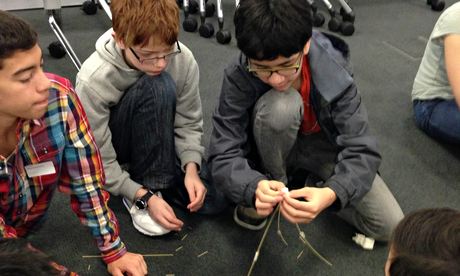
Jaiyun, who is nine, and Chris, 12, have been making a robot catapult on a program called Scratch. In a lecture room of Imperial College, they're at tech camp. Around 40,000 kids a year go to tech camp in the US while, here in the UK, Jill Hodges runs the only large-scale equivalent, Firetech, for around 400 kids a year.
There is a shortage of people who understand code: there are an estimated 800,000 unfillable jobs in the EU. Ah, you don't like numbers? Then you are going to find this story really difficult.
Using a platform called Scratch, Jaiyun and Chris programed the catapult to fire when it hears a noise of 10 decibels or louder. To break that down to simpler units: Scratch is on a computer; the catapult is a real thing; the little missile that fires would really hit you. "We could set up a company to sell these to armies," Jaiyun realises, then clarifies. "Larger ones than this." "Yes. I'd definitely buy that," I say, meaning it.
Down the corridor, Chloe, a 20-year-old physics student at Imperial, is teaching how to use Makey-Makey, which is a computer-based invention kit, to some kids ranging in age from nine to 12. They're mapping a circuit board to the keys on a computer. "Then," Cyrus, 10, explains, "anything that conducts electricity, like skin, will close the circuit". There's a longer explanation but, briefly, this means they can play a computer-person-piano, touching each other's heads to get different notes. What was improvable about an actual piano, I wondered? This merely cemented my own obsolescence.
In fact, if you can make a tune by touching successive people on their foreheads, that is quite a significant improvement, comical on some existential, inexplicable level. "It's funny," Chloe agrees, "but it's also great when you can see they've got it. Cyrus has definitely got it. I don't know about that lot," she says, cheerfully, gesturing towards the others.
Two kids upstairs are learning Arduino programing, the only course that didn't immediately sell out, and that was because nobody knows what it is. "It's an open-sourced hardware platform," Hodges explains. "Physical computing, if you like." I kept smiling. "Some people call it cyber-embedded systems."
You know when you're in a foreign language comprehension exam? And you stop understanding and you think that if you keep listening, some word will come up that you recognise? And it will make sense of everything that went before it, but underneath you know that will never happen? You're not in a swamp, you're in quicksand, and with every phrase your incomprehension only deepens? It was a bit like that. But only for me; the kids liked it.
At the Python table, they were learning the solid coding basics: conditionals, variables, loops, Boolean logic.
Hodges, who is from California, set up Firetech camp two years ago because she couldn't find anywhere to send her own kids, who were nine and 11. She was surprised that tech camps didn't exist in the UK, even though she's been here 20 years and should have got used to our peculiar blind spot when it comes to opportunities for child improvement, made to sound fun with the addition of the suffix "camp". Firetech has proved outlandishly popular, and it's obvious why: people who like this kind of thing find it absolutely engrossing.
Guy, 13, is doing his first text-based coding. "I've always wanted to make games," he says, engagingly, "because I'm one of those people who are just crazy about them. I know a lot about them, the history and stuff. So I'm making this Indiana Jones-style adventure game. I've sorted out the movement. Now I'm working on a gun."
Elizabeth, 13, who is downstairs working on an app, says languidly, "ICT [information and communications technology] in schools is really basic. We've done cyberbullying, like, six times." Eleven-year-old Malcolm, sitting behind her, has worked up a game in which you have to reach a maple leaf while several moose try to kill you. "I got the inspiration from my friends, who call me the Canadian ginger." (Somewhat tangentially, there is a list on the whiteboard of things they're not allowed to say to each other: spaz, retard, gay, Miley Cyrus, Justin Bieber and shut up. They all seemed to get on really well but, of course, you can never tell because kids are weird.)
The thing about coding, Hodges points out talking specifically about apps, but it applies pretty widely: "It's relatively easy to have a good idea, it's actually quite hard to find someone who can implement it." We all have an app idea (I have a seriously great one) in the same way that we all used to have an idea for a novel. The difference is that you'll have to wait for a generation before there will be someone available to design it for you.

